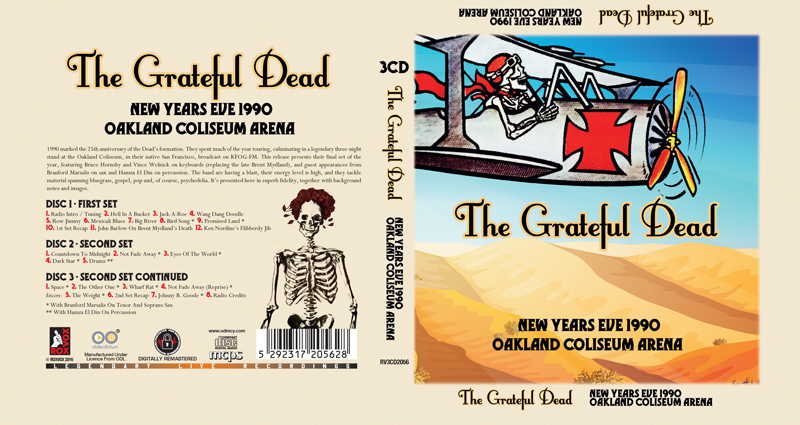THE GREATFUL DEAD - NEW YEARS EVE 1990 OAKLAND COLISEUM ARENA
3 CDs with Cardwallet Clamshellbox NEW YEARS EVE 1990 OAKLAND COLISEUM ARENA

‘It was the first thing that happened to the Grateful Dead when they arrived in New York City on June 1st, 1967, and Jerry Garcia remembers it as though it were – well, the Summer of Love. “Somebody picked us up at the airport in VW buses,” recalled the guitarist by telephone recently. “We hit town and there was a little parade. The hippies from the East Village came, and we took our gear to Tompkins Square Park and played with the Fugs. It was fun.” It was also free. Back then, the Dead (whose longtime core includes guitarist Bob Weir,bassist Phil Lesh, and drummers Bill Kreutzmann and Mickey Hart) were intensely playful alchemists who took audiences along on bluesy psychedelic star flights that played fast and loose with musical parameters. Today it’s a somewhat different ntity, a heavily mythified and economically prosperous beast with nearly 30 years’ collective experience behind it. As other groups gang up to offer cost-efficient concert packages, the Dead easily sell out scores of arena shows each year on their own with minimal hype. Sometimes quality and consistency become their own reward. For Garcia, the Dead are in a transitional period, having replaced Brent Mydland (who died of a drug overdose last year) with keyboardists Bruce Hornsby and Vince Welnick. “I would say that, within the next couple of years, the band will go through some interesting changes,” he says. “I think we’re going to end up with something more powerful than what we’ve had in the past. When you add more guys, you’ve got to have a greater agreement about precisely what the tempos are and how the time is divided. Especially since one of the guys is Hornsby, who has great chops, and is into dividing up the time into little teeny pieces.” Despite its inherent looseness, and occasional jams with the Neville Brothers and Branford Marsalis, the Grateful Dead event-experience has become more codified over the years –much like its eternally tie-dyed, mainly college-aged audience. Does Garcia ever get a notion to shake the whole thing up? “Absolutely. As a matter of fact, I’m doing that right now in a mild sort of way. Because it suddenlyoccurred to me this last year that, hey, I’m starting to get a little tired.” Is there anything specific Garcia wouldlike to see the Dead do more of? “I’d like to see us take more vacations!” he says with a laugh. “But if we’re going to keep on doing this, we have to focus on making it more fun for us. If that means making it more challenging, or whatever it takes, that’s what we’ve got to do.” Don›t fret about Garcia retiring anytime soon; he won›t hit 50 until next year. Garcia and the Dead have always operated as analternative to the music industry. Many of their recordings are available only on the band’s ownlabel, while approximately half their concert tickets are sold through Grateful Dead Ticket Service,which Ticketmaster and Ticketron have pressured the group to discontinue. Although the band records for a major label, Arista, its records often seem like afterthoughts to the concert experience. By giving ld songs fresh twists, like a repertory jazz group, the roadwork fuels their legend while paradoxically making them less appealing to an industry that relies on the appearance of constant novelty to generate profit. According to Garcia, the main problem with the music industry is that it isn’t doing anythingto support its future. “Where are musicians going come from? The music business makes enough money so there could be a music college or something, but it doesn’t give anything back. It’s notvery conscientious.”While drugs still tend to play a certain part in muchof the audience’s enjoyment of the band (every religion needs its sacrament), Garcia himself shiesaway from the sort of chemical stimulation that inspired the band’s improvisatory adventures. Garciaclaims not to remember the last time he intentionally Played live on LSD. “Acid today comes in such small doses that if they dosed me, I don’t think I’d noticeit, to tell you the truth. Sometimes I feel like I’ve been hit with something, so I’m sure it occasionally happens. But I get a serious buzz just playing. My responsibility is to deliver a competent show, and I have enough trouble going out there normal! The days you could get high and the audience wouldn’t mind are over”– Newsday, September 1991
